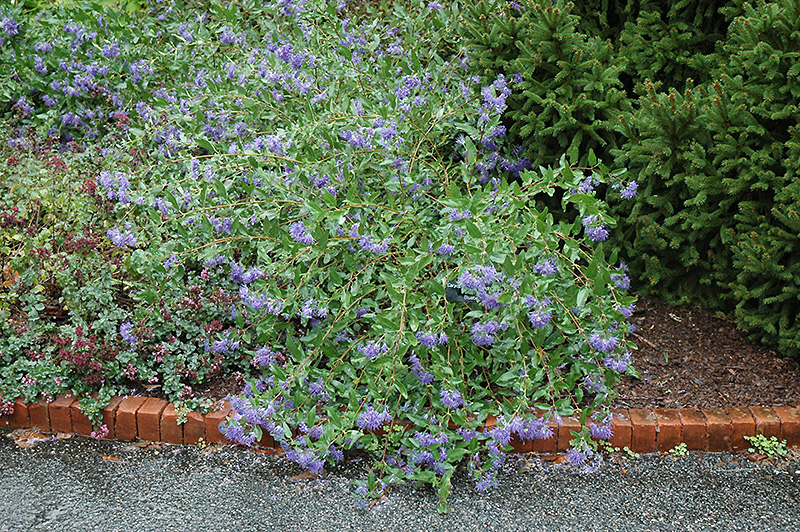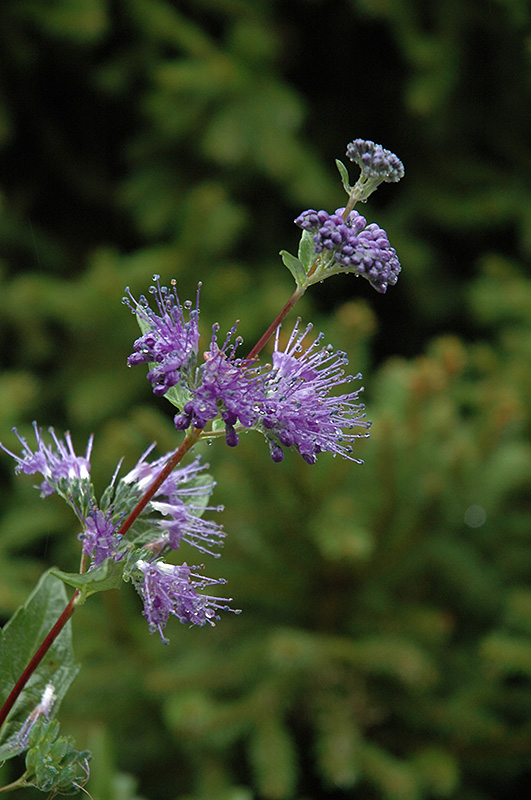
Blue Mist Caryopteris in bloom
Blue Mist Caryopteris in bloom
(Photo courtesy of NetPS Plant Finder)
Height: 3 feet
Spread: 3 feet
Sunlight:
![]()
Hardiness Zone: 6a
Other Names: Bluebeard, Blue Spirea, Blue Mist Shrub
Description:
Light, airy shrub with powder-blue flowers held over bluish-green leaves; foliage has fuzzy, silver undersides and is fragrant when crushed; a true butterfly magnet for the garden
Ornamental Features
Blue Mist Caryopteris features dainty cymes of powder blue flowers along the branches from late summer to early fall. The flowers are excellent for cutting. It has grayish green foliage with silver undersides. The fuzzy oval leaves do not develop any appreciable fall color.
Landscape Attributes
Blue Mist Caryopteris is an open multi-stemmed deciduous shrub with an upright spreading habit of growth. Its relatively fine texture sets it apart from other landscape plants with less refined foliage.
This is a relatively low maintenance shrub, and is best pruned in late winter once the threat of extreme cold has passed. It is a good choice for attracting birds and butterflies to your yard, but is not particularly attractive to deer who tend to leave it alone in favor of tastier treats. It has no significant negative characteristics.
Blue Mist Caryopteris is recommended for the following landscape applications;
- Mass Planting
- Border Edging
- General Garden Use
- Groundcover
- Container Planting
Planting & Growing
Blue Mist Caryopteris will grow to be about 3 feet tall at maturity, with a spread of 3 feet. It tends to fill out right to the ground and therefore doesn't necessarily require facer plants in front. It grows at a medium rate, and under ideal conditions can be expected to live for approximately 20 years.
This shrub should only be grown in full sunlight. It does best in average to evenly moist conditions, but will not tolerate standing water. It is not particular as to soil type or pH. It is somewhat tolerant of urban pollution. This particular variety is an interspecific hybrid.
Blue Mist Caryopteris makes a fine choice for the outdoor landscape, but it is also well-suited for use in outdoor pots and containers. With its upright habit of growth, it is best suited for use as a 'thriller' in the 'spiller-thriller-filler' container combination; plant it near the center of the pot, surrounded by smaller plants and those that spill over the edges. It is even sizeable enough that it can be grown alone in a suitable container. Note that when grown in a container, it may not perform exactly as indicated on the tag - this is to be expected. Also note that when growing plants in outdoor containers and baskets, they may require more frequent waterings than they would in the yard or garden. Be aware that in our climate, most plants cannot be expected to survive the winter if left in containers outdoors, and this plant is no exception. Contact our experts for more information on how to protect it over the winter months.
A NetPS Plant Finder tool
